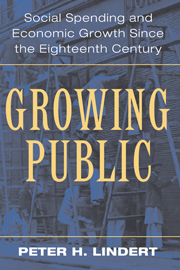2 - Findings
Published online by Cambridge University Press: 26 December 2009
Summary
Since the eighteenth century, the rise of tax-based social spending has been at the heart of government growth. It was social spending, not national defense, public transportation, or government enterprises, that accounted for most of the rise in governments' taxing and spending as a share of GDP over the last two centuries.
The increasing role of social spending in our lives has been linked to three other great social transformations: the transition to fuller democracy, the demographic transition toward fewer births and longer life, and the onset of sustained economic growth. Social spending's share of national product derives its permanence from the likely permanence (we hope) of these three great transformations – that is, of democracy, of human longevity, and of prosperity.
NINE CONCLUSIONS
Exploring these themes leads to a set of varied but logically consistent results. The rest of this chapter offers a guide to the whole set of arguments of the entire book, grouping most of them around these nine conclusions:
(#1) There was so little social spending of any kind before the twentieth century primarily because political voice was so restricted.
(#2) The central role of political voice is shown by an exceptional early case. Both Britain's relatively high poor relief in 1782–1834 and its cutbacks in 1834 and 1870 fit the changing self-interest of those with voice.
(#3) Similarly, just noting the interests of those with voice helps to explain Chapter 1's education puzzles: Why did Germany and laissez-faire North America lead the way in tax-based public schooling, and why did Britain lag behind in the nineteenth century? How did the United States remain a leader in educational attainment, yet end up ranked about fourteenth in students' test scores? Again, the concentration of voice was the enemy of education.
[…]
- Type
- Chapter
- Information
- Growing PublicSocial Spending and Economic Growth since the Eighteenth Century, pp. 20 - 36Publisher: Cambridge University PressPrint publication year: 2004



